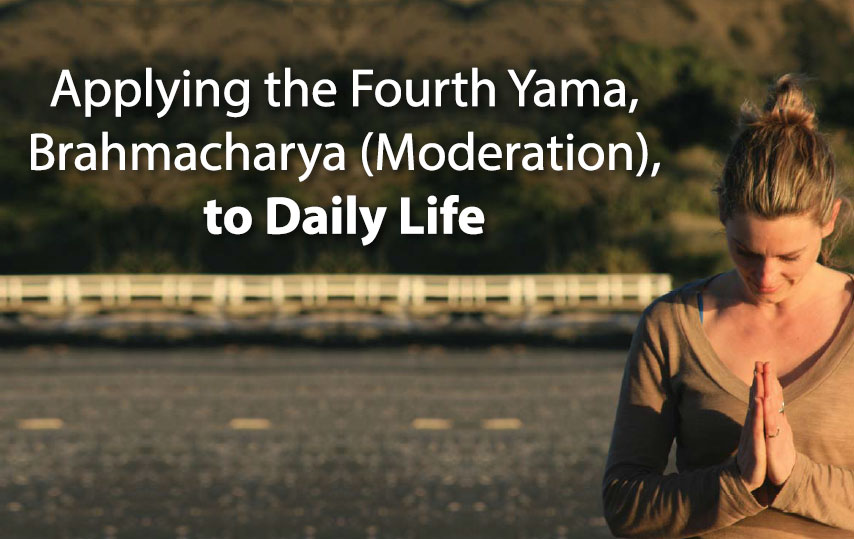For any Yoga practitioner, living in a sex-obsessed, God-wary, materialistic, consumerist society, this has to be the most difficult yama not just to understand, but also to follow.
Who wants to be celibate? And what for?
What does moderation actually mean?
And how on earth does one become established in Divine Consciousness? I mean … come on!
From the study and application of the ?rst three yamas, I’ve observed in my life how powerful and real living out the yamas can be. They’re not guidelines for living because it’s the “right” thing to do. They’re observations of ways to live that create certain results. I know therefore that living out Brahmacharya must have a great result on one’s life. And knowing what that bene?t is can be a powerful motivator to taking action.
Of course, you can’t experience the result without ?rst doing the action, all you can do is read about it. And that’s mostly what I’ve done – read about this yama and contemplate what it means in my life. There haven’t been any big instances of “a-ha” moments. There have been moments when I’ve realised how far away from living out this yama I can be.
If we look at it ?rst from the perception of moderation – in all things, we can see that living this yama completely undermines our usual way of being in society. Living in Brahmacharya means we have control over our impulses of excess, whether that’s in shopping, food, sex, drugs, TV … anything. Whatever it is that we like to indulge in, lose ourselves in or obsess over … gone!
Sex in the City comes to mind. All those shoes that Carrie loved to buy … and the clothes … examples of not living in Brahmacharya. Samantha and her men? Not Brahmacharya. Charlotte and her endless quest for the knight in shining armour? Hardly Brahmacharya. And ?nally Miranda. Workaholic Miranda? Needs to apply Brahmacharya to her career.
These women represent, in some way, shape or form, women of western society. OK, not all women! But most of us can see some element in there that we relate to – that’s one reason why the series was so hugely successful. So why are their various obsessions something to be let go of on the yogic path? Why does it matter?
It’s pretty simple really.
Think about how much time and energy those women devote to their various obsessions and quests. Now think about what would happen if that time and energy was freed up and available for use in other things – like the spiritual journey. When we commit to Yoga, in all it’s aspects, we’re committing to self-realisation, and that requires time and energy. Wasting time and energy on excess and obsession of any kind takes us further away from our path and our goal.
Swami Sivananda has this to say about the practice of Brahmacharya:
Practice of Brahmacharya gives good health, inner strength, peace of mind and long life. It invigorates the mind and nerves. It helps to conserve physical and mental energy. It augments memory, will force and brain power. It bestows tremendous strength, vigour and vitality. Strength and fortitude are obtained … He who is established in Brahmacharya will have lustrous eyes, a sweet voice and a beautiful complexion.
Or, direct from Patanjali’s Yoga Sutras ii:38:
Brahmacharya pratishthayam virya labhah.
Upon being established in Brahmacharya, there is the attainment of vital energy.
In my own life, I’ve seen this most clearly in my obsession over making my relationship work. When things are tough and there’s drama going on, all my focus and energy is absorbed into worrying about the relationship, trying to ?x the relationship, making the relationship work … it’s relentless!
As I discovered, letting go of the relationship and just letting it be what it will be has been enormously freeing. Both for me, and of my energy. Suddenly, I’m able to devote myself whole-heartedly to my Yoga practice again, and to the work I’m doing for the Yoga community. It’s such a relief to realise that I don’t have to control the relationship. All I need to do is stay open, loving and present. Letting go has also freed me up to observe other things that can sap my energy. Eating too much chocolate. Doesn’t feel good. Even half a glass too much of wine is energy sapping. Sleeping too long. Or not enough.
It feels like truly understanding this yama will take time, and being able to apply it to daily living will be an on-going practice for a long time before it becomes second nature.


















 Other
Other